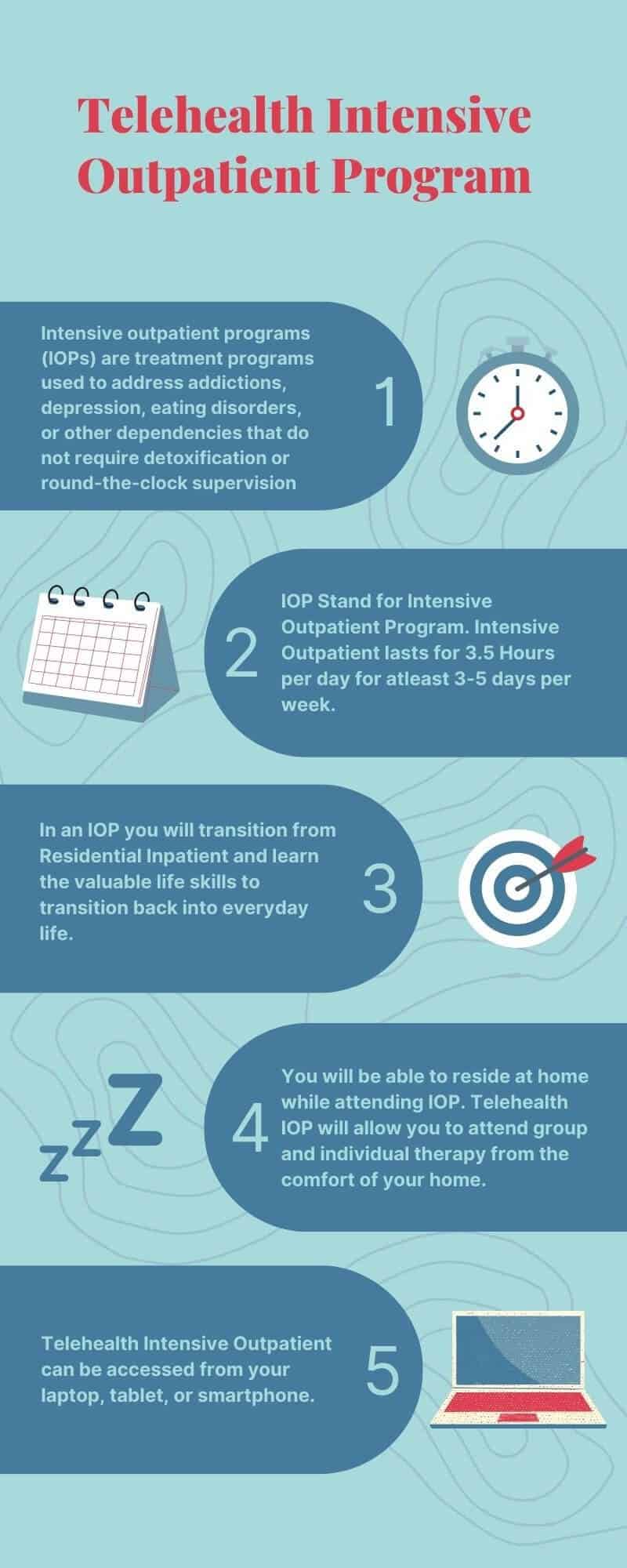The Benefits of Intensive Outpatient Program (IOP) for Long-Term Wellness.
The Benefits of Intensive Outpatient Program (IOP) for Long-Term Wellness.
Blog Article
Browsing the Intricacies of Double Medical Diagnosis Therapy Within an Intensive Outpatient Program Setting
In the world of psychological wellness and dependency treatment, the crossway of twin diagnosis presents a nuanced difficulty that requires a comprehensive and tailored approach. By exploring the intricacies of dual diagnosis treatment within this extensive outpatient context, a more clear course emerges towards alternative and sustainable recovery for those grappling with these linked challenges.
Twin Medical Diagnosis Summary

Understanding double diagnosis is necessary as it requires an extensive and integrated strategy to treatment. By acknowledging the interaction in between compound use and psychological health, doctor can tailor treatments to meet the one-of-a-kind needs of each individual. This alternative technique not just addresses signs and symptoms yet also targets underlying variables that add to the dual diagnosis.
Additionally, untreated dual medical diagnosis can bring about a cycle of relapse and intensifying psychological health signs. By identifying the intricacy of dual medical diagnosis and giving customized care, medical care experts can sustain people in attaining lasting recuperation and enhanced psychological health.
Tailored Therapy Strategies
Identifying the elaborate interaction in between substance use disorders and psychological health problems, the advancement of customized treatment strategies is critical in dealing with the complexities of double medical diagnosis in mental health treatment. Tailored treatment strategies are personalized approaches that think about the distinct requirements, obstacles, and goals of individuals encountering twin medical diagnosis. These plans are made collaboratively by a multidisciplinary team of specialists, including psychoanalysts, psycho therapists, social employees, and addiction professionals, to guarantee thorough and integrated treatment.
Tailored therapy plans typically include a combination of therapies, drugs, and behavioral treatments that target both the substance usage disorder and the psychological health condition concurrently. These plans may include cognitive-behavioral treatment, dialectical habits treatment, medication-assisted treatment, individual therapy, team therapy, and family members therapy, to name a few evidence-based treatments. By customizing therapy methods to private scenarios, tailored strategies can address the source of twin diagnosis, promote long-term recuperation, and boost general high quality of life for individuals fighting with co-occurring conditions.
Integrated Treatment Method
An integrated care method in dual diagnosis therapy incorporates medical, psychological, and social treatments to deal with the intricate needs of individuals with co-occurring substance use problems and psychological health and wellness problems. This strategy acknowledges that dealing with one element of a twin medical diagnosis without addressing the various other can result in ineffective outcomes. By integrating clinical interventions such as medication administration for mental health and wellness conditions with emotional treatments like cognitive-behavioral treatment for material usage disorders, individuals receive extensive treatment that targets all elements of their double diagnosis.
By including social treatments like family therapy, vocational support, and community sources, the therapy ends up being more all natural and customized to the person's particular requirements - Intensive Outpatient Program (IOP). On the whole, an integrated treatment technique in twin diagnosis treatment within an extensive outpatient program setting aims to offer detailed, effective, and personalized treatment to individuals encountering co-occurring problems.
Difficulties in IOP Setting
In the context of dual diagnosis treatment within an extensive outpatient program, browsing the intricacies of co-occurring substance usage conditions and mental wellness conditions provides significant difficulties. One of the main hurdles in the IOP setup is the coordination of care in between mental health and wellness experts and chemical abuse professionals to guarantee a detailed treatment approach. This requires efficient communication, cooperation, and a deep understanding of how these problems connect and affect each various other.

In addition, dealing with preconception and resistance to treatment within the IOP setup can impede progression. Some people might be hesitant to divulge their double medical diagnosis or may feel embarrassed, preventing their involvement in the therapeutic procedure. Overcoming these obstacles requires a supportive and non-judgmental Full Article environment that cultivates trust and visibility.

Collaborative Specialist Efforts
Reliable twin diagnosis therapy in an extensive outpatient program demands smooth partnership among mental wellness professionals and material abuse specialists to ensure a comprehensive and incorporated technique to care. By working with each other, these specialists can develop personalized treatment plans that cater to the distinct demands of each client, thinking about both their psychological health and compound misuse difficulties.
Collaborative initiatives also reach normal interaction and info sharing amongst employee to make sure a cohesive therapy approach. This may involve instance seminars, joint sessions with the individual, or shared documentation to track progress and change treatment strategies as required. Additionally, collaboration might consist of entailing other health care experts such as health care medical professionals or family members specialists to give alternative support to the patient. Eventually, a joined front of professionals working together enhances the effectiveness of dual diagnosis therapy within an intensive outpatient program.
Verdict
To conclude, efficient twin medical diagnosis treatment within an extensive outpatient program setup calls for customized therapy strategies and an integrated treatment method. Challenges might develop in this setup, however collaborative initiatives among professionals can help navigate these intricacies. By addressing the special needs of link people with co-occurring psychological health and compound utilize conditions, IOP programs can provide detailed and holistic care to sustain healing and total health.
Report this page